Top 32 Free Bookmark Manager Apps To Organize Your Massive Bookmark Collection
Table of Content
A bookmark manager is a tool that allows users to store, categorize, and retrieve Internet bookmarks, also known as favorites. With the vast amount of information available online, it's easy to lose track of useful websites or resources.
Bookmark managers help to prevent this by providing a centralized location for storing links, which can be tagged and organized according to user preference. This makes it easier to find and access the saved resources later, boosting productivity by saving time otherwise spent on searching.
Bookmark managers often come with additional features such as the ability to share bookmarks with others, import or export bookmark lists, and synchronize bookmarks across multiple devices. This further enhances productivity by providing access to the saved resources from anywhere, at any time. It also facilitates collaboration by allowing users to share useful resources with their team or network.
A related concept is the "read-it-later" system, popularized by apps like Pocket. These systems allow users to save interesting articles, videos, and more, which they can come back to when they have more time.
This helps users manage their online reading more effectively by allowing them to curate their own reading list.
It also ensures that they don't miss out on potentially useful or interesting content just because they're busy at the moment they come across it. By reducing distraction and information overload, read-it-later systems can significantly improve users' online reading experience and enhance their productivity.
In the following list, we collected the best open-source bookmarks manager.
1. Shiori
Shiori is a simple bookmarks manager written in Go. It can be used as a command line or web application, and is distributed as a single binary for easy installation.
The app features include basic bookmarks management, import/export capabilities, a clean command line interface, a web interface, portability, support for various databases, offline archiving of webpages, and web extension support for Firefox and Google Chrome.
2. Wallbag
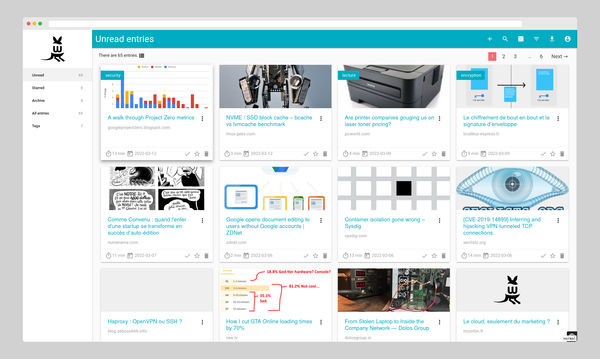
Wallabag is a web application that helps manage content overload by allowing users to save web pages for later reading. It features a user-friendly interface and goes beyond bookmarking by extracting the primary content from pages for a distraction-free reading experience. Wallabag ensures users never miss out on valuable web content and can enjoy it at their own pace.

3. Postmarks
Postmarks is a self-owned bookmarking site that can interact with other Postmarks sites and any text-based ActivityPub platform. The site allows the owner to manage bookmarks with a valid login.
The setup process involves renaming your project in the settings, which determines your domain and identity on the fediverse. Changing this later can disrupt connections with existing followers.
4. Shaark

Shaark stands as a robust, open-source, self-hosted platform, expertly engineered to empower users in capturing, preserving, and disseminating their content. This innovative platform is the masterstroke of Marceau, a seasoned full-stack web developer hailing from France.
Harnessing the power of Laravel, a cutting-edge PHP framework, Node.js, and a suite of open-source libraries, he meticulously crafted Shaark, delivering a definitive solution for content management.

5. LinkAce
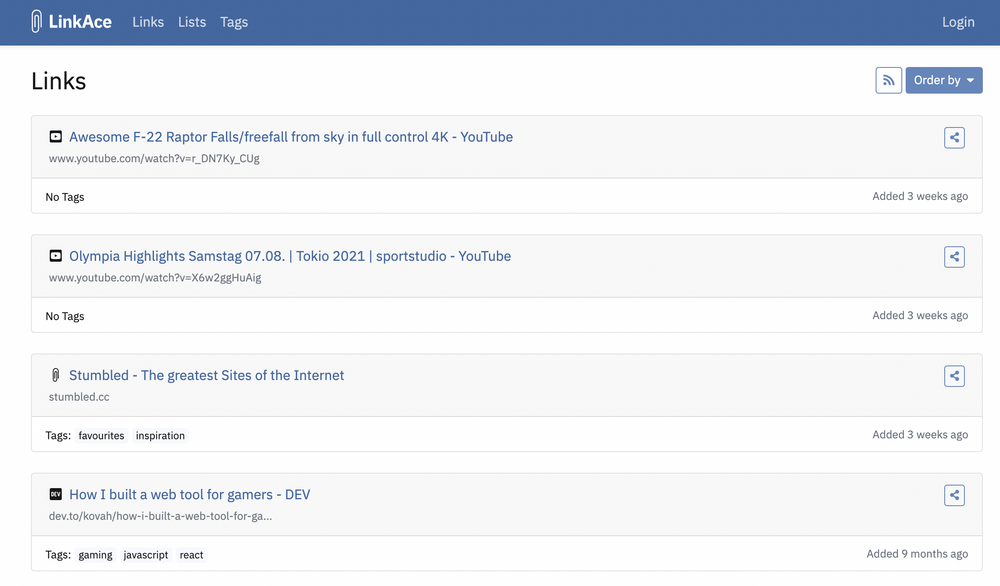
LinkAce, a commendable free open-source, self-hosted bookmarking and archiving solution, masterfully assists users in storing, archiving, tagging, and classifying their bookmarks.
This exceptional tool is the brainchild of esteemed open-source developer Kavin Woblick, and it stands as a secure and private fortress for managing bookmarks, making it an unparalleled solution for teams, communities, and families. The project thrives on the solid backing of a vibrant community that has diligently translated it into multiple languages and persistently develops third-party tools and updates the documentation.

6. Benotes
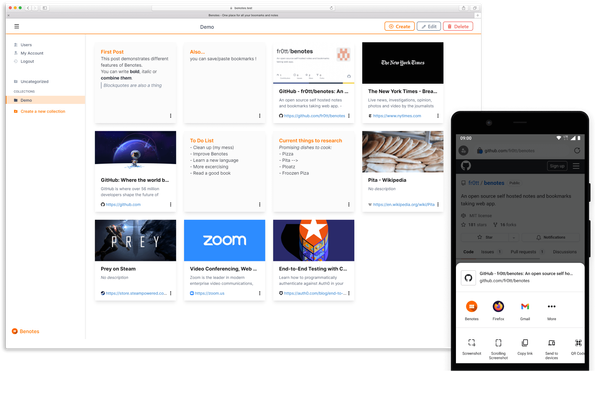
Benotes is a robust self-hosted web application designed for note-taking and bookmarking. Key features include an automatic URL saving function with metadata, markdown and rich text editing, and compatibility with Progressive Web Apps for seamless use across various platforms.
The application simplifies content sharing by generating public URLs for collections and allows easy addition of links for new posts. Currently progressing confidently through its beta phase, Benotes is a promising tool for efficient note-taking and bookmark management.
7. Osmos::Memo

Osmos::memo is a free, open-source browser bookmark manager designed for speed and efficiency. It allows users to easily extract a page's title and URL into a markdown snippet, offers efficient tagging and instant search, and is part of the OsmosCraft project.
It is beneficial for developers, freelancers, teams, agencies, and researchers in managing resources and references. The application requires minimal setup and is available for installation from the Chrome web store.
8. Shaarli
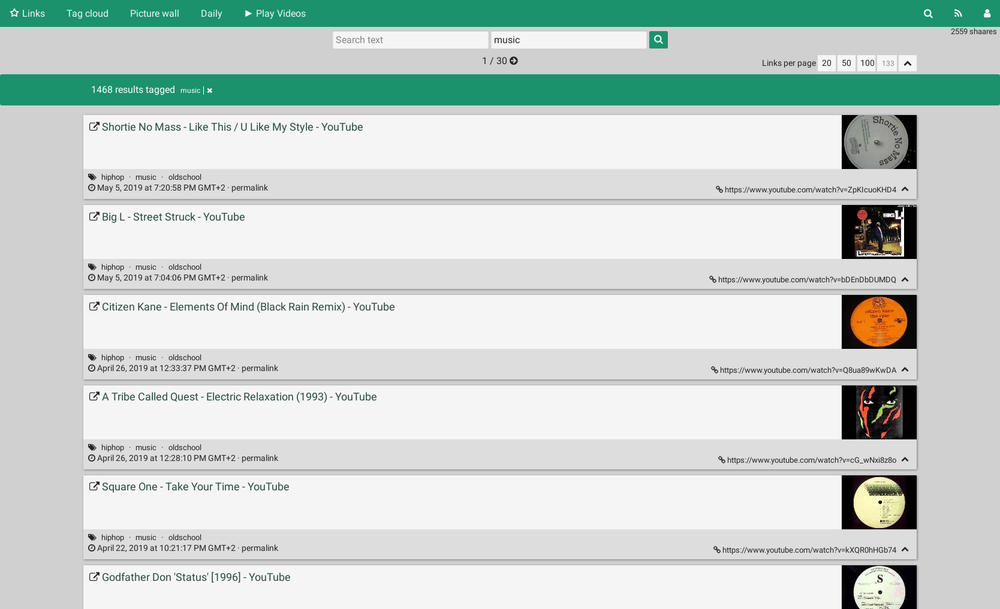
Shaarli, a complimentary web-based treasure box for your bookmarks, offers an elegant solution to catalog and arrange your links. Its responsive interface dances smoothly to your commands, while its advanced search functionality swiftly finds your saved pearls. Adding links is a breeze, and organizing them with tags is as easy as pie.
It even comes with QR code support for quick access, a unique link extraction feature, and a captivating picture wall to visually browse your images. Install Shaarli conveniently either from source or via Docker, and embark on a delightful bookmarking journey.

9. 🌳 Betula, a federated personal link collection manager
Betula is a free and open-source self-hosted bookmarking software with optional Fediverse support. It allows users to publish bookmarks with optional titles and descriptions, add tags, and choose between public and private sharing. The software features a simple user interface, tag autocompletion, IndieWeb microformats, and a single SQLite file for saving the collection. It also supports reposting from other Betula instances and following other Betulas on the Fediverse.
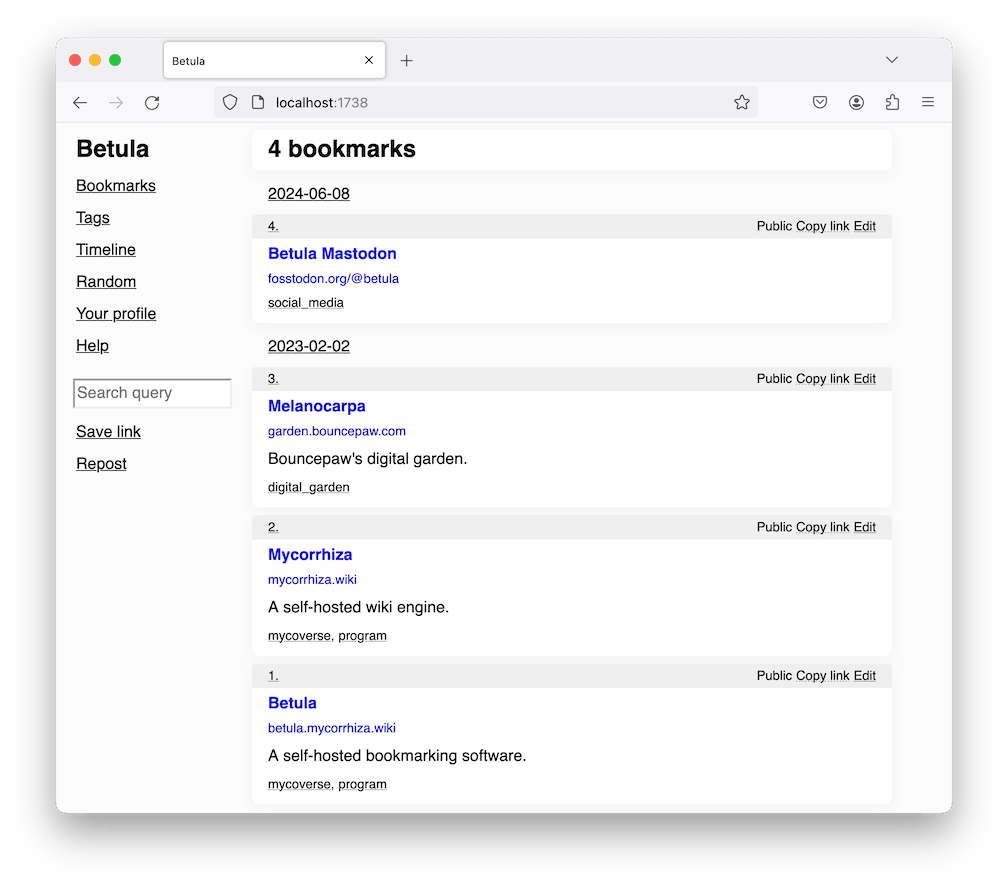
10. Linkding
Linkding is a self-hosted bookmark manager with a clean UI, offering features like tag organization, bulk editing, markdown notes, and sharing capabilities. It automatically provides titles, descriptions, and icons of bookmarked websites and archives them. It supports import and export in Netscape HTML format, can be installed as a PWA, and has extensions for Firefox and Chrome. It also includes SSO support and a REST API for third-party app development.
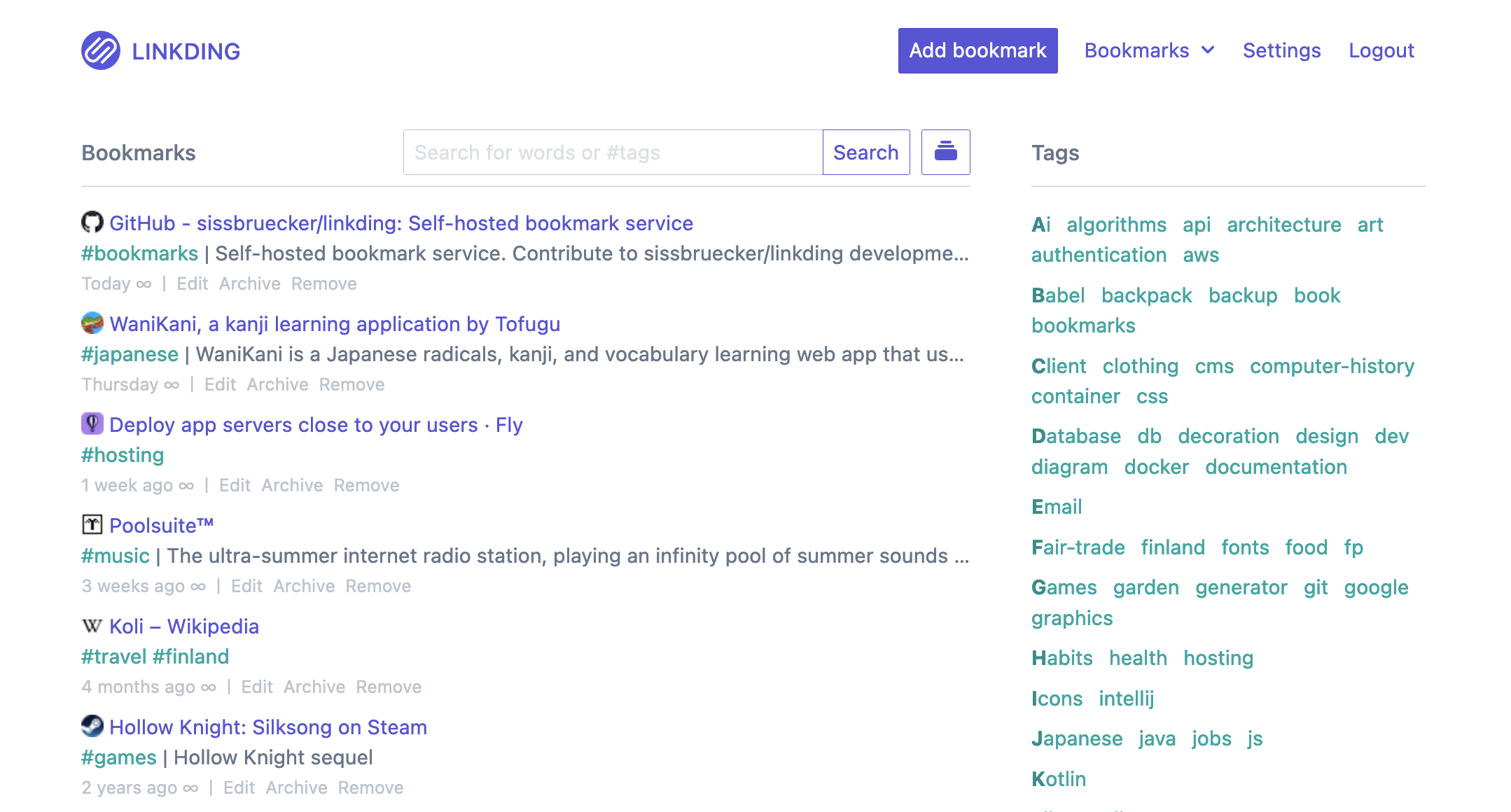
11. Buku
Buku is a powerful, flexible bookmark manager with both command-line and GUI options. It allows users to import bookmarks, fetch information from URLs, and search bookmarks with multiple options.
It also features a Wayback Machine lookup for broken links and has no tracking or hidden history. Buku also functions as a library and has several related projects, including a browser plug-in.

12. Linwarden
Linkwarden is an open-source, collaborative bookmark manager that allows users to collect, organize, and preserve webpages. It offers features such as organizing links with collections and tags, preserving webpages against link rot, collaborative resource gathering, customizable permissions, and easy sharing of collections.
Additional features include a responsive design, privacy-friendly policies, powerful search, a browser extension, dark and light mode, bulk actions, import and export capabilities, an installable PWA for mobile, and secure API integration.
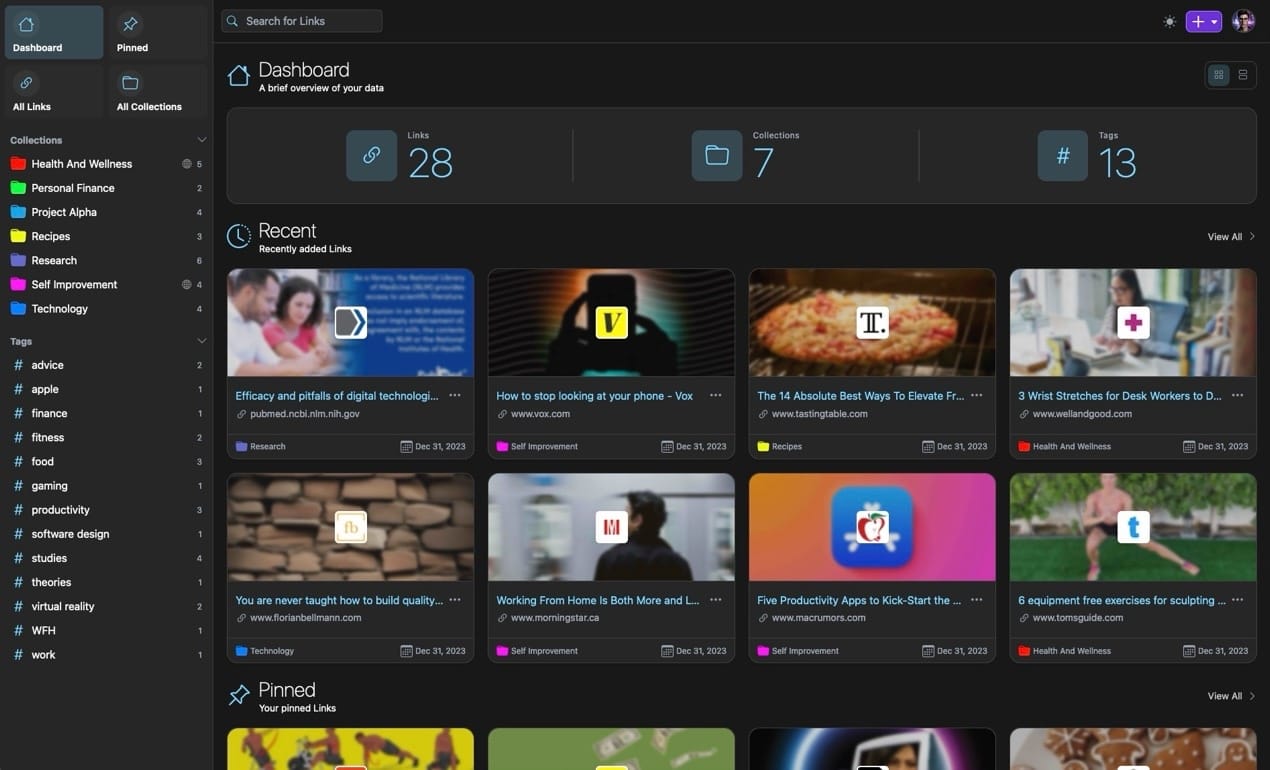
13. LinkWallet
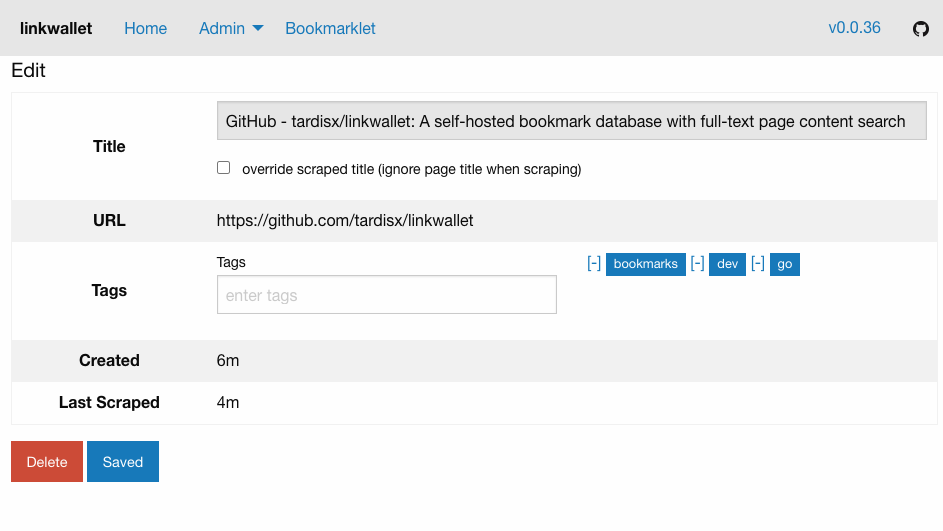
Linkwallet is a free self-hosted bookmark database with full-text page content search. It offers fast search results, automatic re-scraping of bookmark content, and easy bookmark management.
It also allows for the application of tags, import and export of bookmarks in bulk, and adding bookmarks with two clicks via the bookmarklet. The service is light on resources and does not require a separate database.
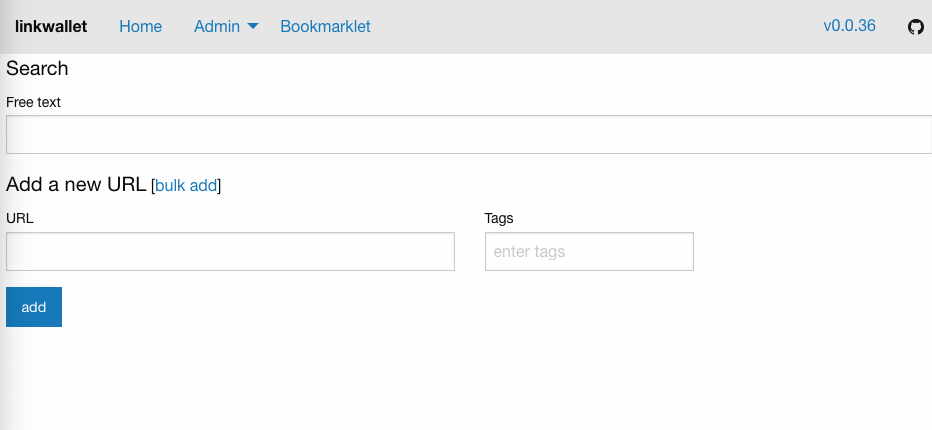
14. Servas
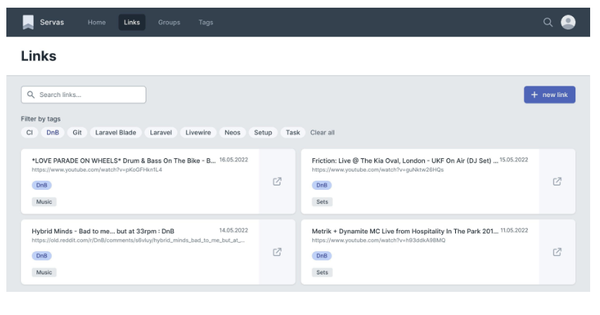
Servas, a self-hosted bookmark management tool, offers a robust tagging system and the capability to group bookmarks, including creating nested groups. Built on Laravel and Inertia.js, with a frontend designed using Tailwind CSS and Svelte, Servas provides a user-friendly and organized way to manage digital resources.

15. Link Portal
The Link Portal is a simple multitenant web app for managing team bookmarks. It allows users to create bookmarks, group them with tags, create tenant or project-specific dashboards, invite others to projects, and star bookmarks for a personal dashboard. The app uses GitHub SSO for authentication.
It is built using Next.js, TypeScript, Tailwind CSS, and can be deployed easily on Vercel.
16. LinkLion.org Portal
LinkLion.org is a portal that stores mappings generated from Link Discovery steps from LOD sources. It supports the upload of RDF-formatted N-Triple data, which should be enriched with metadata such as the framework and algorithm used, and information about the sources. The RDF data and metadata are then converted using existing ontologies and the LinkLion.org ontology.
17. WebCrate
WebCrate is an app that allows users to organize links, articles, and more from around the web in a central place. It offers a minimal, intuitive interface and customizable features, including the ability to add context to each link and use emojis to distinguish different collections, or "crates".
Users can share their crates and subscribe to others' crates. The app is cross-platform and privacy-focused, running on Deta Space, a personal cloud.
18. Links
Links is a simple yet powerful personal links manager.
19. LinkHub (mobile)
LinkHub is a free mobile app that enables Android users to organize their links easily with a user-friendly features and design.
You can download the app for Android from many sources.
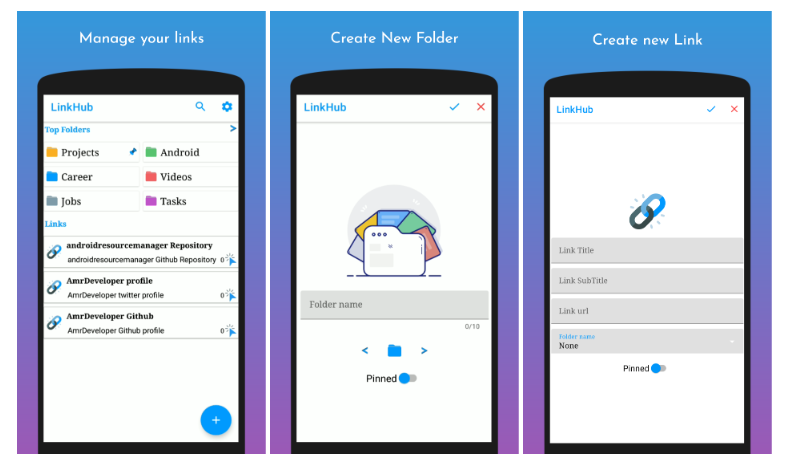
20. Kangaroo desktop
The Kangaroo desktop project aimed to modernize cloud usage by creating a browser-based desktop. Features included the ability to add links and store files to a cloud-synced desktop, drag and drop items, create a folder structure, and share folders. With a Chrome extension, users could download and upload files from the internet, set the new tab default to Kangaroo Desktop, and store the current tab to the desktop using shortcuts.
21. Linkbox
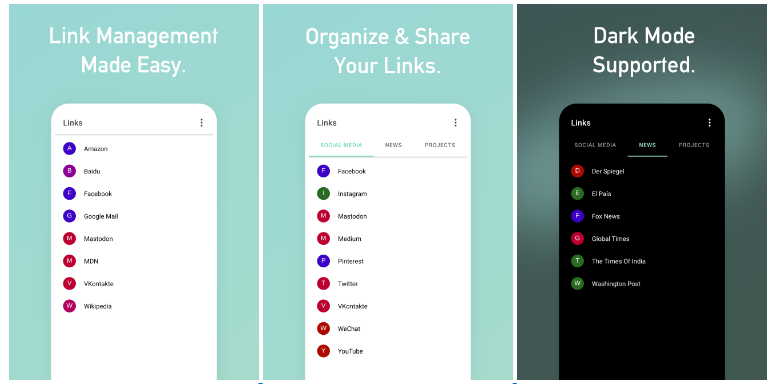
Linkbox is a free tool for managing links with features such as organizing links using tabs, operating without an internet connection, no ads or tracking, a true black theme for dark mode, easy import and export of data and settings using JSON files, and easy addition and sharing of new links.
22. Lynx (Next.js)
Lynx is an open-source platform for sharing, managing, and discovering links and bookmarks. It's built with a tech stack including PostgresSQL, Prisma, Next.js, Node.js, Hyper-Express, and React-Native.
Its features include dark mode, link sharing, discovery, management, trending links, easy import/export, a clean modern design, and fast performance with PWA readiness.
23. Link-Manager
Link Manager is a comprehensive utility for storing URLs, quickly finding them, and extracting them from specific web addresses. The program is free, portable, and easy to use.
24. Link Manager (Android)
The Link Manager app allows for tracking, managing, and sharing of links for Android Systems. It utilizes technologies such as Kotlin, MVVM Architecture, Room, ViewBinding, Coroutines, and several other libraries.
25. Codever
Codever is a self-hosted, web-based bookmark and snippet manager designed for developers, game developers, and agencies. It features a user-friendly interface and a robust API, and is compatible with various platforms and tools through dedicated extensions and plugins.
Its responsive design ensures a seamless experience across different devices, and it supports multiple accounts, making it suitable for both individual freelancers and large teams.
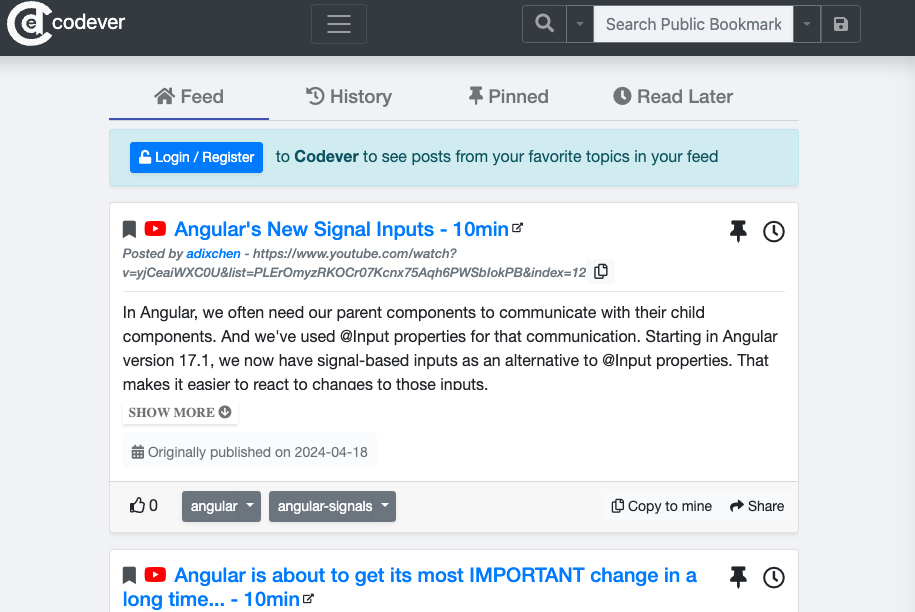
26. FavBox
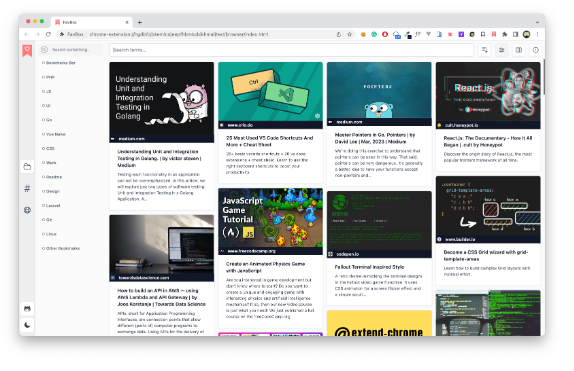
FavBox is a browser extension that enhances bookmark management, offering features such as syncing with your browser profile, tag support, advanced search, multiple display modes, light and dark themes, page previews, duplicate detection, broken URL detection, quick access to search with hotkeys, and it's free and open source.
27. Slash
Slash is a free open-source, self-hosted link shortener and sharing platform that simplifies the organization and sharing of links.
It transforms complex links into simple shortcuts, supports tagging for better organization, and enables team sharing of link libraries. With a browser extension, Slash integrates into your daily online workflow, addressing the common problem of link chaos.
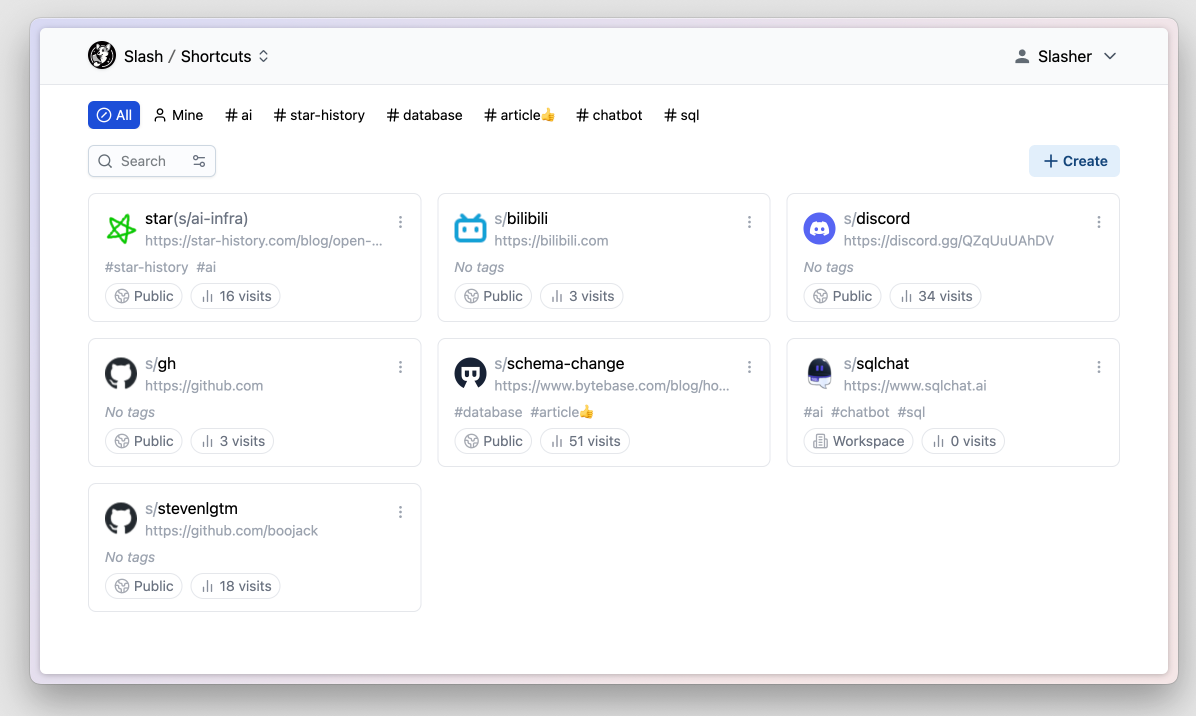
28. Poche
Poche is a free and open-source alternative to services like Pocket, Instapaper, and Readability. It offers features such as adding, deleting, archiving, and favoriting links, importing from other services, and sharing links via email and Twitter.
29- Omnivore
Omnivore is a free open-source read-it-later solution with features like highlighting, notes, search, sharing, full keyboard navigation, and automatic saving of reading progress. It supports adding newsletter articles via email, PDFs, and has apps for iOS and Android, as well as browser extensions. It also offers offline support, text to speech, and integration with Logseq and Obsidian.
30. Horarder
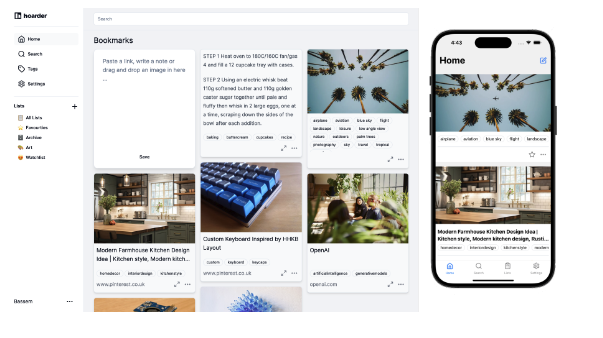
Horarder is a web-based self-hostable application that allows users to bookmark links, take notes, and store images. It features automatic fetching for link details, sorting bookmarks into lists, full-text search, AI-based automatic tagging, and browser plugins for quick bookmarking.
It also offers mobile apps, dark mode support, and prioritizes self-hosting. Future plans include downloading content for offline reading.
31- Cherry
Cherry is a web-based self-hostable bookmark service.
32. Raindrop
This is a free and open-source Bookmark extension for Google Chrome.












